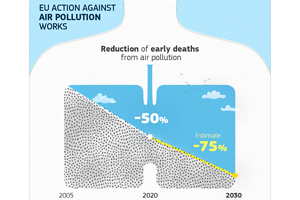Air pollution is a matter of life and death

Related topics
Air qualitydate: 26/10/2022
EU policies have brought major improvements in the quality of our air, but more needs to be done. The main culprits are particulate matter, nitrogen dioxide, and ozone, from energy, transport, industry and agriculture. Absorbed through our lungs, they pass into our blood, damaging vital organs and, according to some studies, they may even damage our brain.
Around Europe, air pollution is still the number one environmental cause of premature death, with hundreds of thousands of people dying early every year due to dirty air. Millions more suffer from the effects of polluted air, with asthma, cardiovascular diseases and lung cancer, all of which are now linked to pollution beyond dispute.
The vulnerable suffer most from air pollution, with children, the elderly and poorer people the worst affected. In the words of the WHO, air pollution is ubiquitous and involuntary – it affects you regardless of what you do. We can’t choose the air we breathe, but we can choose to improve it. It’s time for a new approach, with effective measures to speed the change.
Our citizens firmly believe that EU air quality standards ought to be stronger. Most citizens believe that large industrial installations and fossil-fuel based energy producers are not doing enough to promote good air quality. European citizens ask for stricter pollution controls for all these activities. Household heating, agriculture and transport also still pollute too much. As a result, over 9 in 10 urban dwellers in the EU are exposed to levels of air pollution above the recommendations of the World Health Organization (WHO).
That’s why the Commission is proposing a major upgrade of air quality legislation. It’s time to give our zero pollution goals the force of law, halving the damaging health impacts of air pollution by 2030, and ensuring that by the middle of this century at the latest, the quality of our air is no longer harmful to human health.
There’s an urgent need to raise the standards, and align them more closely with WHO guidelines. That’s why we will set stricter norms for ozone and for fine particulate matter, or PM 2.5 – cutting the maximum allowed level by more than half by 2030. And we will keep those standards under regular review, to update them according to science and technological progress. The new law will also provide better public information, and a better framework for local authorities to achieve cleaner air.
The health benefits will be substantial, with lower rates of mortality and illness, and a lower burden on overstretched healthcare systems. It will also help secure our food supply, as ozone is a significant cause of reduced crop yields. The benefits far outweigh the costs, with total gross benefits estimated at between 42 and 121 billion EUR in 2030, for measures that should cost less than 6 billion euros. And we can not put a price tag on the life of our beloved ones.
New elements in the proposal will ensure that citizens are better protected, with rules effectively implemented on the ground. Better air quality monitoring and modelling will help everyone understand exactly what is going on. There are also clearer rules on access to justice, and on effective penalties when laws are breached.
One major novelty is a right for citizens to be compensated when their health has been damaged as a result of a failure to observe national measures. This new law will provide citizens with strong tools to claim justice, because fresh air should not be a luxury. I think of it more as a basic human right.
It’s time to give citizens the right to claim compensation for the damage they suffer.
That’s how similar legislative mechanisms work in many other areas. Time to apply it to the air we breathe. It’s what our citizens demand and that’s what they deserve.
